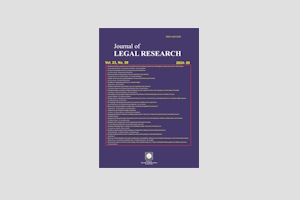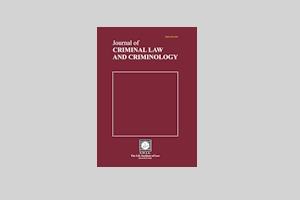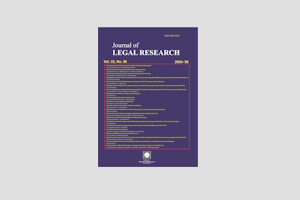Journal of
Legal Research
Number 12
Vol. VI No. 2
Autumn 2007 – Winter 2008
Managing Editor: Vahid Eshtiagh
Editor-in-Chief: Seyyed Ghasem Zamani
CONTENTS
Articles
The SC Resolution 1803: Objective Dimensions of Iran’s Nuclear Rights
Nader Saed (Ph.D.)
Legal Relations of Parties to Electronic Letter of Credit
Mehdi Etemadi, Ali Tazikinezhad
Illegality of Holding more than One Public Post in Iran: With a Glance at the French Legal System
Javad Taghizadeh (Ph.D.)
Private Military and Security Companies and International Humanitarian Law
Pouria Askary
The Criterion of Political Offence in French Law and Effect of Supreme Courts on It
Seyed Mahmood Majidi (Ph.D.)
Non-physical harms and compensatory measures: a Comparative Study
Seyed Abulghasem Naghibi (Ph.D.)
Special Issue: Traffic Law
The Impact of the Traffic Regulations on Social Behaviors
Vahid Eshtiagh (Ph.D.)
Insurance and Traffic Law: A Connective Relationship
Abdollah Khodabakhshi
Pedestrians’ Rights and Duties in Iran
Mohammad Reza Mehmandar
An Overview of Legal Measures to Protect Pedestrians
Gholam Reza Moini
Unintentional homicide and wounding Resulting from Driving Faults
Ghasem Mohammadi
United Nations and Campaign against”Global Road Traffic Crisis”
Seyed Ghasem Zamani (Ph.D.)
Critique and Presentation
A Critique of the Iranian Patents Act of 2008
Hekmatullah Ghorbani
Policies and Procedures of the Interpol in Combating International Drug Trafficking
Ayyoub Balaee
Articles
The SC Resolution 1803:
Objective Dimensions of Iran’s Nuclear Rights
Nader Saed (Ph.D.)
Abstract:
Resolution 1803 (2008) of the Security Council (SC) which adopted in accordance with the Chapter VII of the Charter is the fourth resolutions (the third sanction one). Despite the successful achievements of modalities and recent co-operations between Iran-IAEA Secretariat, it precedes concerns of the Council on the nuclear development in Iran. This is seemingly is due to Iran’s non-compliance with the previous resolutions of the Council and one outstanding or unresolved issue named “alleged studies”, as well as non-implementation and ratification of the Additional Protocol of the NPT Safeguard agreements.
… The adoption and continuation of the SC resolutions, seems to reflect legal positivism a theory of which is well-established in contemporary era, where political and other non-legal elements have efficient role in development of international norms, in particular decision-making in international organizations. However, this resolution is non proportional with factual dimensions of “Iran Nuclear Record”. Therefore, the Council should refrain from recourse to additional sanctions against Iran.
Keywords: International Law, Iran, Nuclear Rights, Res. 1803, The UN Charter.
Legal Relations of Parties to Electronic Letter of Credit
Mehdi Etemadi
Ali Tazikinezhad
Abstract:
Provisions of the EUCP (2002) brings the documentary credit into the electronic age. Moving toward the electronic presentation of documentary credit will change the duties and responsibilities of the banks involved in the paper credit contracts. Although agent banks may be needed for the purposes of finance, risk-related purposes and political issues, such a change may diminish the banks roles. EUCP as a method of electronic payment has its own problems. This article examines the legal relations of the parties to an electronic letter of credit; its special cases such as electronic presentation of records (time and place of the presentation), hyperlinks, and changes in the electronic data in general and electronic records in particular, notions and methods of electronic survey of the records and etc.
Keywords: Applicant, Beneficiary, Electronic Letter of Credit, Electronic Presentation, Issuing Bank.
Illegality of Holding more than One Public Job in Iran:
With a Glance at the French Legal System
Javad Taghizadeh (Ph.D.)
Abstract:
Article 141 of the Constitution of IRI bans holding more than one public job. The way article 141 is formulated may bring to the mind this possibility that it is only included executive employees. Nevertheless, a careful examination of the article and the interpretative comment of the Guardian council confirm otherwise. All public jobs holders, therefore, are subject to the general ban of the article.
The only constitutional exception is in the academic positions in the universities and research institutions. In regard to jobs n private sectors, article 141 permits their holding beside the public job. Nevertheless, the legislator banned public jobs holders from managing some private jobs like justice advocacy or legal consultation. The law of prohibition of holding more than one job and some other laws and public regulations like country’s Islamic councils law have also mentioned the new orders for explaining and completing of inclusion of the principle 141 of the Constitution.
Keywords: Academic Positions, Civil Servants, French Legal System, Iranian Legal System, Private Job, Public Job and Position.
Private Military and Security Companies
and International Humanitarian Law
Pouria Askary
Abstract:
While the presence of private military companies in conflict situations is not new, their numbers have grown and, more significantly, the nature of their activities has changed. In addition to the more traditional logistical support, PMCs / PSCs have been involved more and more in activities that bring them close to the heart of military operations – and thereby into close proximity to persons protected by International Humanitarian Law.
It is sometimes said that PMCs operate in a legal vacuum, that international law gives no answer as to how violations committed by their staff should be handled. Such a broad statement is incorrect from a legal point of view and it is important to stress that obligations do exist in that regard. In particular, with regard to two main issues:
The status, rights and obligations of the employees of PMCs / PSCs, and the obligation of States to respect and ensure respect for International Humanitarian Law in connection with the activities of these companies.
Keywords: International Humanitarian Law, Private Military, Security Companies, State Responsibility.
The Criterion of Political Offence
in French Law and Effect of Supreme Courts on It
Seyed Mahmood Majidi (Ph.D.)
Abstract:
Taking a decision about a compassionate penal policy or the other way in the case of political criminal is one of the most difficult tests for governments in the field of making criminal law’s internal and external (formal) disciplines. Examining historical changes demonstrates different positions and polices adopted by states in this concern. As many countries the new French penal law didn’t show a complete definition of political crime and its features .The lack of a legislative definition of the criminal act is one of the most important reasons for the existence of many ambiguities in the lawyer’s judgments and French judicial policy. Despite that, French Supreme Court has tried to eliminate these ambiguities and legislative methods bravely during recent years. These methods can be considered by all countries which their legislative ambiguities in defining the notion of political crime have deprived political offenders from certain formal and substantive legal privileges.
Keywords: French Law, Objective Standard, Political Criminal, Political Offence, Subjective Standard.
Non-Physical Harms
and Compensatory Measures: A Comparative Study
Seyed Abulghasem Naghibi (Ph.D.)
Abstract:
In addition to the normal punishment, Islamic penal law suggests certain compensatory measures against those who are inflicting non-physical harms to others. The amount of which inflicted party receives is discretionary left to the judge to decide. The main concern of this article is to discover similarities and differences of the private punishment theory and the above Islamic norm.
Keywords: Islamic Penal Law, Non-Physical Harms, Compensatory Measures, Crime, Islamic Punishment.
The Impact of the Traffic Regulations
on Social Behaviors
Vahid Eshtiagh (Ph.D.)
Abstract:
Main concern in this article is to discuss traffic regulations in a wider context. In this line of thought, considerable impact of the traffics regulations on social behaviors of the citizens, most notably their understanding and compliance with other laws and regulations has been highlighted.
Keywords: Crime, Crime Prevention, Criminology, Social Behaviors, Traffic Accident, Traffic Regulations.
Insurance and Traffic Law:
A Connective Relationship
Abdollah Khodabakhshi
Abstract:
There is a close connection between insurance and traffic law, injury compensation is one of the most significant and obvious one. Common goal of these two sets of norms is the main basis of the mutual normative relationship between these two systems. We must be, therefore, adopt a reconciling interpretative approach in understanding their norms and principles. Since the real aim of insurance and traffic rules is to prevent traffic accidents, they must act and understood in coexisting rather than conflicting way. The main focus of this article is to existing jurisprudence dealing with relation between insurance and traffic rules.
Keywords: Compulsory Insurance, Driver, Insurance, Liability Insurance, License Driving, Third Party, Traffic Accident.
Pedestrians’ Rights and Duties in Iran
Mohammad Reza Mehmandar
Abstract:
Legal framework dealing with the protection of pedestrians is a particular one, and thus calls for a specific attention. In this short article, my main concern is to examine protections offered by the Iranian legal system to pedestrians in Iran. It is obvious that this protection is not a one way privilege; there are some duties imposed by the Iranian legal system on pedestrians too. Mapping rights and duties of the pedestrians in Iran is the main task of this article.
Keywords: Pedestrian, Protection of Victims, Traffic Accident, Traffic Regulations.
An Overview
of Legal Measures to Protect Pedestrians
Gholam Reza Moini
Abstract:
Industrial revolution and development of different means of transport have played a significant role in evolution of civil liability regulations. To cope with particular requirements of the legal liability is the main reason for abandoning traditional regulations of tort, and thus adopting new regulations in this area. These new rules were first adopted by the European countries, and latter by others. Iran was heavily influenced by this new system, and compulsory third party accident insurance act was adopted first and then completed by some other acts for the protection of traffic events, including those involving pedestrians. However adoption of the Islamic Penal Code stopped this protecting process. Also role of judicial precedent and practice of the courts, to implement IPC, in dismantling previous Acts should not be ignored.
Keywords: Civil Liability, Compulsory Third Party Accident Insurance Act, Islamic Penal Code, Means of Transport, Tort.
Unintentional Homicide and Wounding
Resulting from Driving Faults
A Study about Its Criminal Nature and Classification
Ghasem Mohammadi
Abstract:
Homocide and wounding have been classified into three categories by Islamic Penal Code of Iran, however there is another type of unintentional homicide, resulting from driving faults in ch. 27 of the fifth part of the same Code, that seems ambiguous. By examining the term in the Iranian previous codes and comparing it with the above-mentioned classification, the article does not regard this type as a distinct category but recognizes it as one of same triple categories.
Keywords: Driving Faults, Fault, Homicide, Islamic Penal Code of Iran, Negligence, Recklessness, Unintentional Homicide, Unintentional Wounding.
United Nations
and Campaign against “Global Road Traffic Crisis”
Seyed Ghasem Zamani (Ph.D.)
Abstract:
Despite Significant improvements in road safety in several countries over the past few decades, 1.2 million people are killed every year in road traffic crashes, and up to 50 million people are injured, many suffering life-long disability. In recognition of this growing global crisis, the United Nations General Assembly passed many resolutions since May 29, 2003. In addition to urging member states to address the growing problem of road traffic injuries, the resolutions called for international cooperation to support the efforts of developing countries in particular. The resolutions invited the World Health Organization, in collaboration with the United Nations regional commissions, to coordinate road safety efforts within the United Nations family. In this article I want to survey the UN resolutions on improving global road safety.
Keywords: Global Road Safety Crisis, Human Rights, Human Safety, Regional Commissions, Right on Health, Road Traffic, UN General Assembly, World Health Organization.
Policies and Procedures of the Interpol
in Combating International Drug Trafficking
Ayyoub Balaee
Abstract:
It is an imperative to combat organized drug trafficking. Such a move has to be comprehensive enough to cover policies as well as procedures to deal with all aspects of drug challenges and lead to increasing co-operation and contribution of all concerned bodies at executive level at the same time. Viewed from this perspective, the constitution of the International Criminal Police Organization (ICPO) has been one of the most outstanding steps taken in the early years of the 20th century aiming at combating international organized crimes including drug trafficking. The position held by the Interpol in international law system and its executive procedures in combating the international drug trafficking is my main concern in this article.
Keywords: International Drug Trafficking, Interpol, Organized Crimes, Trafficking.





